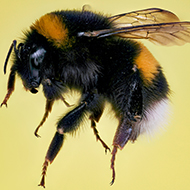Bees increasingly stressed over climate change - study

“Museum insect collections offer an unparalleled opportunity to directly study how the genomes of populations and species have been affected by environmental changes through time" - Dr Victoria Mullin.
Climate change has made bumblebees increasingly stressed over the last century, according to new research.
In the study, scientists from Imperial College London and Natural History Museum, London, analysed the body shapes of museum specimens dating back to 1900.
During development, bees develop asymmetrical wings when they experience stress. The team found that bees showed higher wing asymmetry - very differently shaped right and left wings - during hotter and wetter years.
The findings are published in the Journal of Animal Ecology.
Study author Dr Andres Arce, now at the University of Suffolk, commented: “Our goal is to better understand responses to specific environmental factors and learn from the past to predict the future. We hope to be able to forecast where and when bumblebees will be most at risk and target effective conservation action.”
A second study saw the same team successfully sequence the genomes of over one hundred bumblebee specimens dating back more than 130 years. It was the first time the technique - which is usually used to study woolly mammoths and ancient humans - was used on an insect population.
The team used one leg from each of the bees studied. Their results – published in Methods in Ecology & Evolution – will enable researchers to determine how the reported stress may lead to the loss of genetic diversity.
Author Dr Victoria Mullin, from the Natural History Museum, said: “Museum insect collections offer an unparalleled opportunity to directly study how the genomes of populations and species have been affected by environmental changes through time. However, they are a finite resource and understanding how best to utilise them for genetic studies is important.”
Senior author Professor Ian Barnes, also from the Natural History Museum, said: “One of the main problems with museum collections is that the quality of DNA can be very variable, making it difficult to predict which type of analyses we should do. We now have a much better idea about DNA preservation in insect collections, which is a massive boost to our ongoing work to understand the history and future of insect populations.”
Scientists will use the data gathered to study how bee genomes have changed over time, leading to a greater understanding of how populations have or have not adapted to changing environments.



 The Veterinary Medicines Directorate (VMD) is inviting applications from veterinary students to attend a one-week extramural studies (EMS) placement in July 2026.
The Veterinary Medicines Directorate (VMD) is inviting applications from veterinary students to attend a one-week extramural studies (EMS) placement in July 2026.